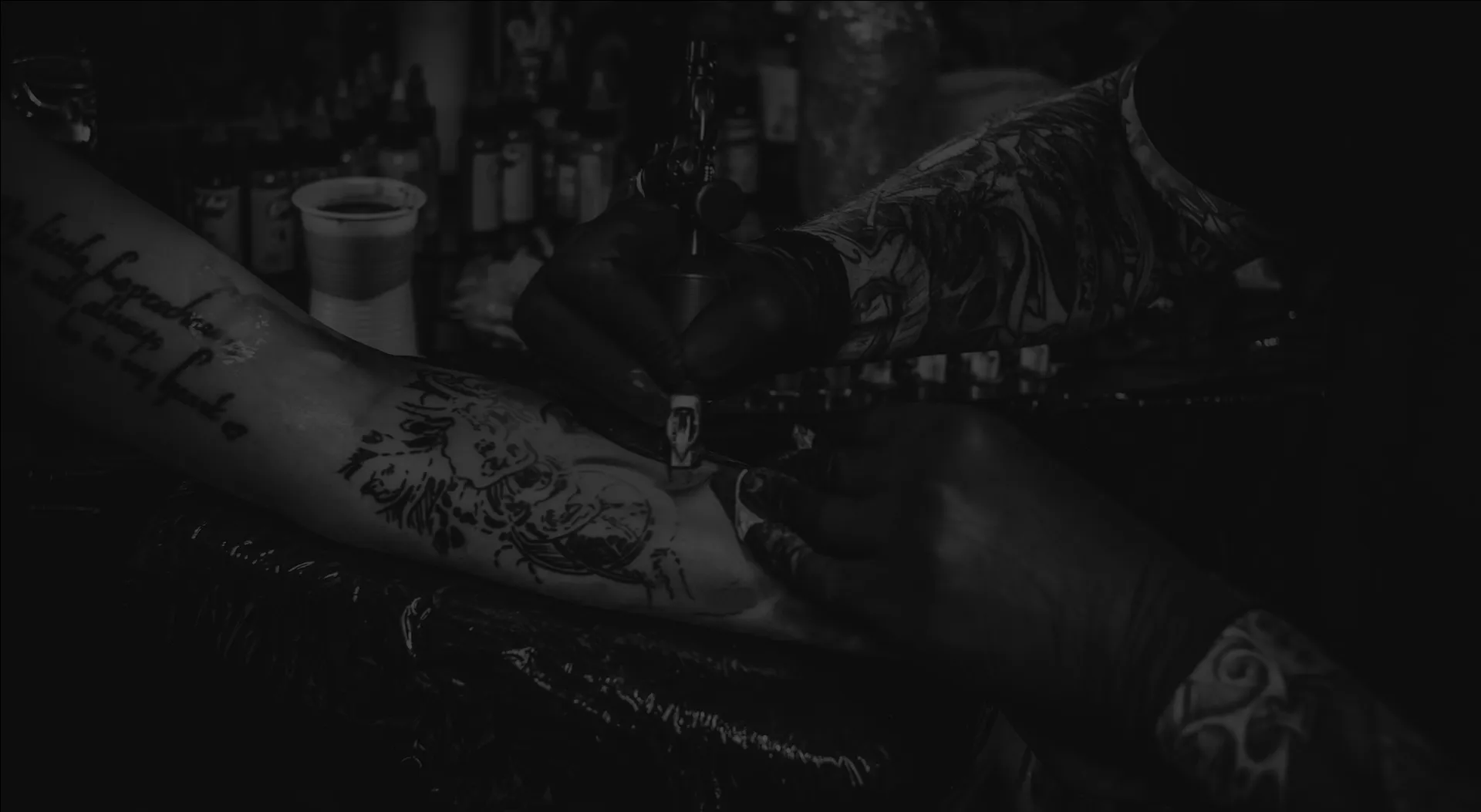Taking care of a new tattoo, PMU, piercing, or skin after laser treatment or cosmetics mainly involves following increased hygiene measures in the first few days. During this time, you should use antibacterial soap, avoid contact with dirty objects, refrain from swimming in lakes or pools, avoid touching the area with dirty hands, and protect it from mechanical damage. Do not scratch. Do not remove scabs.
After Tattooing
Remove the film covering your new tattoo on the third to fifth day before sleeping and wash it thoroughly with antibacterial soap. Peel off the film under warm water (the film will come off more slowly, but that’s not a problem). After washing, do not reapply the film! For the first three days after removing the film, wash the tattooed area with antibacterial soap three times a day.
During washing with antibacterial soap, DO NOT APPLY CREAM! Begin applying cream (Tattoo Ointment Calcium Panthotencium, Bepanthen Plus) only on the third day after tattooing, and do so once, at most twice a day, applying it in small amounts and rubbing it into the skin thoroughly so that no greasy film remains. For the first 10 days after tattooing, do not soak the area in water (pool, bath, natural water bodies, sauna), only shower. Avoid sun exposure (including tanning beds) for one month.
Avoid sports and physical activities for the first 5 days after tattooing. Avoid mechanical damage to the new tattoo and do not remove scabs. If using Tattoo Goo cosmetics, follow the enclosed instructions for use.
After Permanent Makeup
Care after permanent makeup is crucial for achieving optimal results and preventing complications. Here are some key tips for caring for the treated area:
Immediately after the procedure, do not use makeup. Avoid applying any makeup to the treated area to prevent infections and irritation. Avoid touching and scratching the treated area to prevent infections and damage. For the first 3 days, gently clean the tattooed area with clean water and antibacterial soap. Use clean, unused tools for cleaning and wiping to prevent the transfer of bacteria.
Begin applying cream (Tattoo Ointment Calcium Panthotencium, Bepanthen Plus) only on the third day after tattooing, and do so once, at most twice a day, applying it in small amounts and rubbing it thoroughly into the skin so that no greasy film remains. Avoid using oils or creams that may affect the results of the permanent makeup.
For the first 10 days after tattooing, do not soak the area in water (pool, bath, natural water bodies, sauna), only shower. Avoid sun exposure (including tanning beds) for one month. If necessary, use hats or other forms of protection, such as high-factor sunscreens.
Avoid sports and physical activities for the first 5 days after tattooing. Avoid mechanical damage to the new tattoo and do not remove scabs. If using Tattoo Goo cosmetics, follow the enclosed instructions for use.
By following these instructions, you can ensure that your permanent makeup will look great and that recovery will be as smooth as possible.
After Piercing
- Immediately after the piercing, the area may become red or swollen. Don’t worry, this is a normal occurrence that will disappear within a maximum of three days.
- The piercing needs to be cared for - we recommend the cosmetics available for purchase at our studio.
- Avoid touching the piercing with your hands; prevent any contact with foreign objects for at least one week. Also, do not apply mechanical stress, pull, or expose it to similar influences.
- The healing time for a piercing depends on its location, e.g.:
- tongue, eyebrow, nose, ear about 2 weeks
- lips, chin, and navel about 4 to 6 weeks
- The piercing should not be removed for at least 1 month or until it is fully healed. There is a risk that it may not be possible to reinsert it into its original place.
- The piercing site should be washed with antibacterial soap.
We also offer titanium jewelry, which does not cause allergic reactions as can occur with other materials - surgical steel, silver, gold.
After Laser Treatment
For the first 24 to 48 hours after the laser tattoo removal procedure, you should intermittently apply a cold compress to reduce swelling. The first hour after the procedure is crucial, so we provide disposable cooling compresses in our studio. Avoid hot showers, intense exercise, or any activity that may cause sweating. It is also advisable to apply a Cicaplast ointment to aid in the healing process. Avoid using makeup, toner, or any other topical creams on the skin that were not specifically prescribed by your doctor.
Take ZODAC/ZYRTEC to prevent swelling or any allergic reactions. You can also take a painkiller, but if possible, avoid ibuprofen as it may thin your blood and cause more bruising.
For the first few weeks, avoid sun exposure, pools, hot tubs, salty water, or anything else that might irritate your skin. If you must be in the sun, make sure to cover the treated area with sunscreen. Even after the area has healed, sunscreen remains essential when tanning. Regardless, you should use sunscreen on your face and body every day, with special care for the treated area. For at least a month after tattoo removal, do not use self-tanning sprays or lotions, as they may irritate the skin.
If blisters appear on your skin, continue applying a medicinal ointment. Do not pop any blisters. Blisters must naturally subside on their own to prevent excessive skin damage. Similarly, do not remove any scabs that form. Removing skin and scabs can cause infections and scarring, as well as delay the healing process.
Under no circumstances should you shave the area treated with laser. This can cause increased skin irritation, scarring, and infection.
The best thing you can do after laser tattoo removal is to follow all these instructions. The purpose of these guidelines is to provide you with the best possible treatment outcome and ensure that your skin heals properly.

